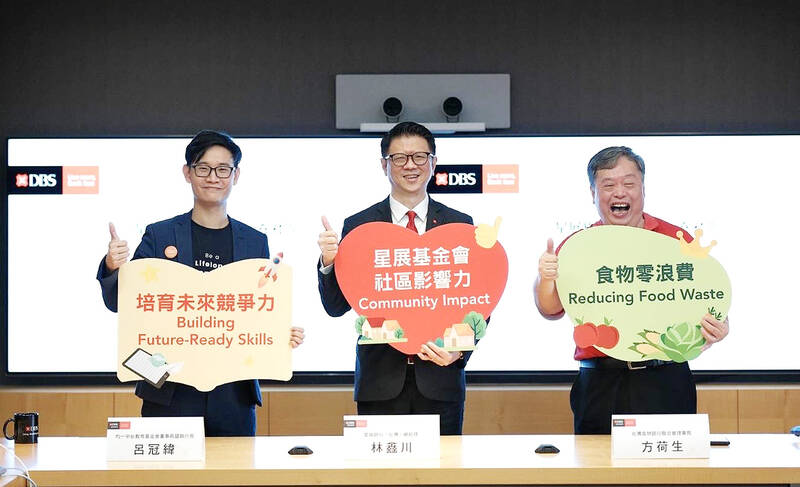DBS Bank Taiwan (星展台灣) is to allocate an additional S$100 million (US$73.67 million) this year to add Community Impact to the DBS Foundation’s existing Business for Impact axis to expand the reach of its philanthropic endeavors and set the goals of “building future-ready skills” and “reducing food waste.”
DBS Taiwan general manager Lim Him-chuan (林鑫川) yesterday said that Singapore-based DBS is committed to promoting sustainability, supporting social enterprises and addressing important social issues through the DBS Foundation.
To address some of Asia’s pressing problems, DBS is focusing its resources on “building future-ready skills” and “reducing food waste.” DBS Taiwan will invest about NT$15 million (US$488,838) over the next three years to collaborate with the Junyi Academy Foundation to promote digital financial education, the bank said.

Photo courtesy of DBS Bank Taiwan
It is also working with the Alliance of Taiwan Foodbanks to reduce food waste by redistributing food resources, it said.
The Junyi Academy Foundation, which is partnering with DBS Taiwan for the first time, is Taiwan’s biggest free online education platform for junior-high and high-school students, with more than 38,000 educational videos and more than 4 million registered users.
Junyi chairman and CEO Ray Lu (呂冠緯) said that the academy provides free digital learning resources for students to learn at their own pace, and to make their learning experience more interesting and efficient.
In the next three years, DBS Taiwan would cooperate with Junyi to set up a “financial literacy zone,” producing more than 30 videos and corresponding financial study topics.
The project is expected to benefit about 100,000 learners each year and eventually make Taiwan more competitive.
In the area of “reducing food waste,” DBS Taiwan is deepening its existing partnership with the Alliance of Taiwan Foodbanks. After helping establish a flagship food bank in Taipei’s Xinyi District (信義), DBS is helping build a large warehouse in Hualien City to serve food banks on the east coast.
Alliance of Taiwan Foodbanks chairman Fang He-sheng (方荷生) said that DBS’ support would enable the alliance to build a 463m2 warehouse in Hualien City, which would be able to store more than 500 tonnes of food and other supplies, thus distributing resources more efficiently and serving at least 20 remote villages and schools.
Every 500 tonnes of soon-to-expire food that goes through the facility would not only meet the needs of 376,000 households, but also cut 110,675kg in carbon emissions from leftover food buried in landfills.

CAUTIOUS RECOVERY: While the manufacturing sector returned to growth amid the US-China trade truce, firms remain wary as uncertainty clouds the outlook, the CIER said The local manufacturing sector returned to expansion last month, as the official purchasing managers’ index (PMI) rose 2.1 points to 51.0, driven by a temporary easing in US-China trade tensions, the Chung-Hua Institution for Economic Research (CIER, 中華經濟研究院) said yesterday. The PMI gauges the health of the manufacturing industry, with readings above 50 indicating expansion and those below 50 signaling contraction. “Firms are not as pessimistic as they were in April, but they remain far from optimistic,” CIER president Lien Hsien-ming (連賢明) said at a news conference. The full impact of US tariff decisions is unlikely to become clear until later this month

Popular vape brands such as Geek Bar might get more expensive in the US — if you can find them at all. Shipments of vapes from China to the US ground to a near halt last month from a year ago, official data showed, hit by US President Donald Trump’s tariffs and a crackdown on unauthorized e-cigarettes in the world’s biggest market for smoking alternatives. That includes Geek Bar, a brand of flavored vapes that is not authorized to sell in the US, but which had been widely available due to porous import controls. One retailer, who asked not to be named, because

CHIP DUTIES: TSMC said it voiced its concerns to Washington about tariffs, telling the US commerce department that it wants ‘fair treatment’ to protect its competitiveness Taiwan Semiconductor Manufacturing Co (TSMC, 台積電) yesterday reiterated robust business prospects for this year as strong artificial intelligence (AI) chip demand from Nvidia Corp and other customers would absorb the impacts of US tariffs. “The impact of tariffs would be indirect, as the custom tax is the importers’ responsibility, not the exporters,” TSMC chairman and chief executive officer C.C. Wei (魏哲家) said at the chipmaker’s annual shareholders’ meeting in Hsinchu City. TSMC’s business could be affected if people become reluctant to buy electronics due to inflated prices, Wei said. In addition, the chipmaker has voiced its concern to the US Department of Commerce

STILL LOADED: Last year’s richest person, Quanta Computer Inc chairman Barry Lam, dropped to second place despite an 8 percent increase in his wealth to US$12.6 billion Staff writer, with CNA Daniel Tsai (蔡明忠) and Richard Tsai (蔡明興), the brothers who run Fubon Group (富邦集團), topped the Forbes list of Taiwan’s 50 richest people this year, released on Wednesday in New York. The magazine said that a stronger New Taiwan dollar pushed the combined wealth of Taiwan’s 50 richest people up 13 percent, from US$174 billion to US$197 billion, with 36 of the people on the list seeing their wealth increase. That came as Taiwan’s economy grew 4.6 percent last year, its fastest pace in three years, driven by the strong performance of the semiconductor industry, the magazine said. The Tsai